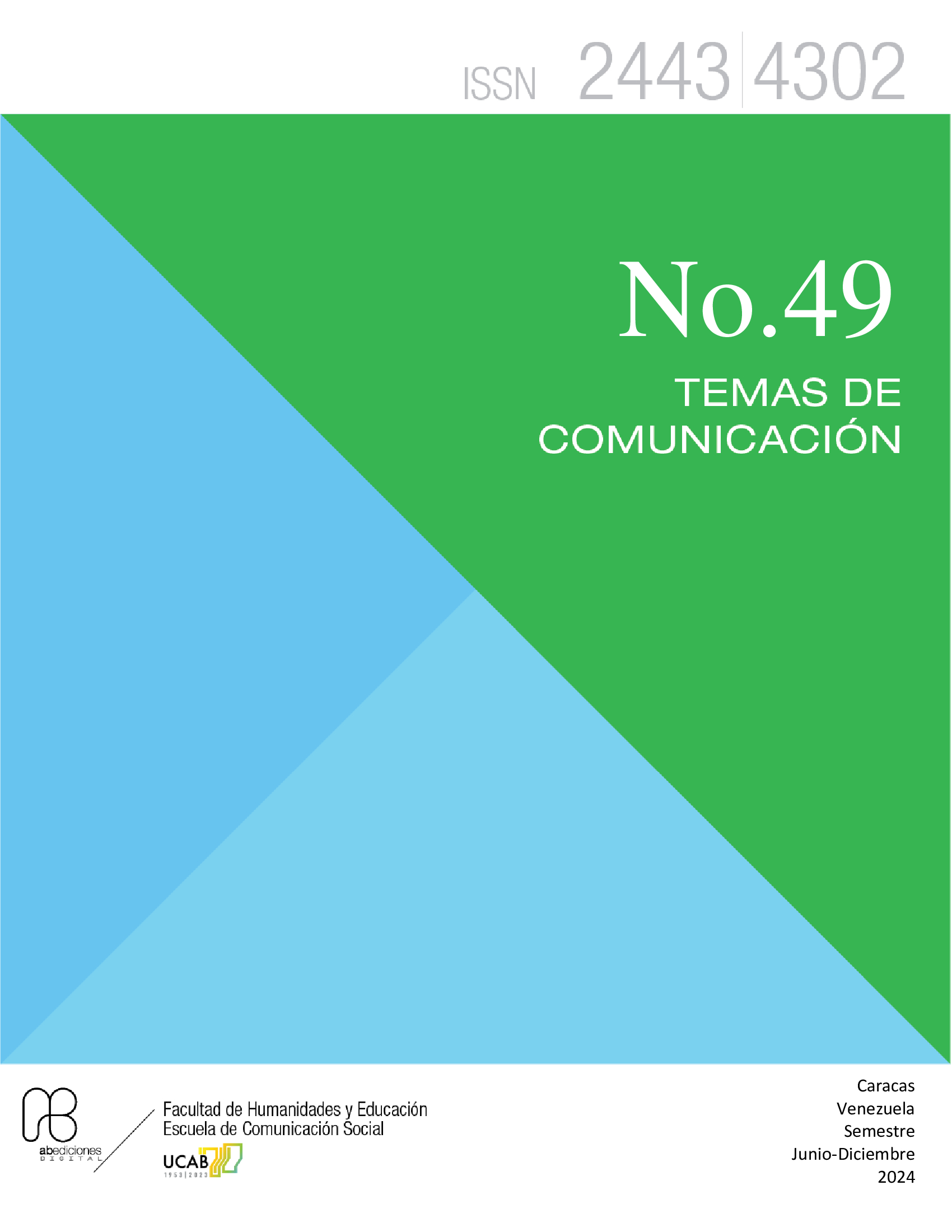Proximity: an alternative to face the problematization of politics and its communication.
DOI:
https://doi.org/10.62876/tc.vi49.7052Keywords:
politics, problematization, communication, leadership, proximityAbstract
The intense and permanent political hostility, the dichotomous simplification and positional issues of the leaders, as well as the impossibility of dialogue and negotiation between the parties and their leaders, are generating weariness in people, which in turn marginalizes them from public conversation and political life. The first problem with the dynamics of rupture is its circularity and centripetal movement. This process entails its feedback, because the very forces of political communication are drawn into the center of this circuit. The second problematic issue is that societies are becoming fractured, losing their sense of commonality and their quality of governability, while politics - that which can potentially reestablish coexistence, order, stability and governability - is also losing its framework for action and its means.
This exposition is based, as a hypothesis, on the fact that this destructive march of society and politics can be reversed. For this, as an objective of this work, it is necessary to inquire about this reality and explore the alternatives to face the problematization of the field, within the scope of the concept of proximity politics that is proposed and argued. The research approaches this approach with a propositional sense. Therefore, it is a question of formulating some strategic uses of the thematization in political communication, as well as a typology of social and political discourses that can contribute to break this vicious circle, using the resources of the proximity politics that is formulated and developed in this work.
Widespread problems or concerns can be used strategically in communication campaigns for proximity purposes. Some of these uses are the identification, prominence or ownership of one or several main issues or problems, or their relevance; the proposition of solutions, including motivations to action; conciliation, openness or proximity; affirmation instead of negativity when referring to public problems; the enumeration of causes or indicators of a problem; symmetry to put or keep oneself at the level of a contender who demonstrates more mastery over an issue.
Downloads
References
Abril, G. (2010). Cultura visual y espacio público-político. Cuadernos de Información y Comunicación, 15, 21-36. Recuperado de https://bit.ly/3uLKRuz
Berry, J. M., & Sobieraj, S. (2014). The Outrage Industry: Political Opinion Media and the New Incivility. Oxford University Press.
Brooks, D. J., & Geer, J. G. (2007). Beyond Negativity: The Effects of Incivility on the Electorate. American Journal of Political Science, 51(1), 1˗16. http://www.jstor.org/stable/4122902
Castells, M. (2020). Ruptura. La crisis de la democracia liberal. Alianza Editorial.
Corporación Latinobarómetro (2023). Latinobarómetro 2023. https://bit.ly/3OPXWKj
Edelman, E. (1991). La construcción del espectáculo político. Manantial.
European Commission (2023). Eurobarometer 2023. https://bit.ly/4bPfkJ6
Gallup (2024). Record Low in U.S. Satisfied With Way Democracy Is Working. https://bit.ly/3SRUCPN
Guerrero-Solé, F., & Philippe, O. (2020). La toxicidad de la política española en Twitter durante la pandemia de la COVID-19. Hipertext.net (21), 133-139. https://doi.org/10.31009/hipertext.net.2020.i21.12
Kosmidis, S., & Theocharis, Y. (2020). Can Social Media Incivility Induce Enthusiasm? Evidence from Survey Experiments. Public Opinion Quarterly, 84(1), 284-308. https://doi.org/10.1093/poq/nfaa014
Landerer, N. (2013). Rethinking the Logics: A Conceptual Framework for the Mediatization of Politics. Commun Theor, 23, 239-258. https://doi.org/10.1111/comt.12013
Levitsky, S., & Ziblatt, D. (2018). Cómo mueren las democracias. Ariel.
Majó-Vázquez, S., Nielsen, R. K., Verdú, J., Rao, N., De Domenico, M., & Papaspiliopoulos, O. (2020). Volume and Patterns of Toxicity in Social Media Conversations during the COVID-19 Pandemic. Reuters Institute. University of Oxford. https://bit.ly/3wCHSoL
Mazzoleni, G., & Schulz, W. (1999). Mediatization of Politics: A Challenge for Democracy? Political Communication, 16(3), 247-261. https://doi.org/10.1080/105846099198613
Mutz, D. C. (2015). In-Your-Face Politics: The Consequences of Uncivil Media. Princeton University Press.
Newman, N. (2024). Journalism, media, and technology trends and predictions 2022. Reuters Institute for the Study Journalism. University of Oxford. https://bit.ly/3T7oyJh
Newman, N. (2023). Journalism, media, and technology trends and predictions 2022. Reuters Institute for the Study Journalism. University of Oxford. https://bit.ly/3uJMOYx
Newman, N. (2022). Journalism, media, and technology trends and predictions 2022. Reuters Institute for the Study Journalism. University of Oxford. https://bit.ly/3SOMdwz
Pew Research Center (2024). Tuning Out: Americans on the Edge of Politics. https://bit.ly/3uR38GP
Rojas-Calderón, A. (2022). Los mensajes políticos y las agendas de la opinión pública. Los usos estratégicos de la tematización en los debates electorales de las generales de 2019 en España. En Mancinas, R., & Figuereo, J. (Coords.). El poder de la comunicación: actores, estrategias y alternativas, 14-59. Dykinson.
Snyder, T. (2017). Sobre la tiranía. Veinte lecciones que aprender del siglo XXI. Galaxia Gutenberg.
Sydnor, E. (2019). Disrespectful Democracy: The Psychology of Political Incivility. Columbia University Press.
Valentino, N. A., Hutchings, V. L., Banks, A. J., & Davis, A. K. (2008). Is a Worried Citizen a Good Citizen? Emotions, Political Information Seeking, and Learning via the Internet. Political Psychology, 29, 247-273. https://doi.org/10.1111/j.1467-9221.2008.00625.x
Wulczyn, E., Thain, N., & Dixon, L. (2017). Ex Machina: Personal Attacks Seen at Scale. En 26th International World Wide Web Conference, WWW 2017, 1391- 1399. https://doi.org/10.1145/3038912.3052591
Downloads
Published
How to Cite
Issue
Section
License
Copyright (c) 2024 Temas de Comunicación

This work is licensed under a Creative Commons Attribution-NonCommercial-ShareAlike 4.0 International License.


